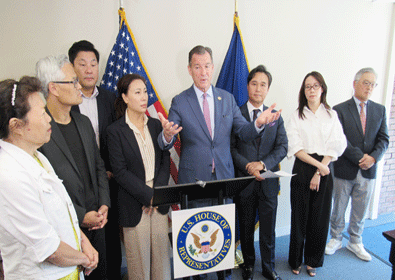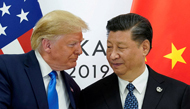Barack Obama recently told Americans something most of them already knew:“Year after year,”he said,“our leaders offer up detailed health plans with great fanfare and promise, only to see them fail.”
This, the president-elect said at a news conference, “simply cannot continue.”
But what exactly can or should Mr.Obama do about health care- A look around the world shows the United States is hardly the only country grappling with the issue.
In Britain, Gardiner Harris reported in The Times, a board that sets medical spending limits has come under heavy criticism. The National Institute for Health and Clinical Excellence, or NICE, has refused to pay for a new cancer drug from Pfizer, because at $54,000 per patient, it is simply too expensive.
That has provoked protests from patients, but it has not stopped other countries from looking to Britain as a model of cost containment. Dr.Andreas Seiter, a senior health specialist at the World Bank, told Mr.Harris, “All the middle-income countries - in Eastern Europe, Central and South America, the Middle East and all over Asia - are aware of NICE and are thinking about setting up something similar.”
That could include China, where the harshness of the medical system is compounding the problems of the economic slowdown. The consumer economy is suffering as families hoard their money against the specter of catastrophic medical expenses.“Health care is so expensive and distorted that no matter how much you save, if you get sick you’re going to end up poor,” Wang Tao, a Beijing-based analyst at USB Securities, told Andrew Jacobs of The Times.
But, in contrast to China, another Communist state is emerging as a touchstone of how a national health care system can work well. As Roger Cohen reported in the Times Magazine, Cuba - despite a stagnant economy and limited civil liberties - has a health care system that affords its citizens life expectancies on par with the United States. Cuba also offers free training for doctors from other countries, and in the process exports its ideas of how universal health care can succeed.
An American student at Cuba’s Latin American School of Medicine, Pasha Jackson, 26, of Los Angeles, told Mr.Cohen: “I feel more valued here than where I grew up. And when I finish, I’m going to go back to my community and bring that same philosophy.”
If he does, he may find health care needs even more pronounced than when he left. As more Americans are losing their jobs in the recession, they are also losing their employer-subsidized health insurance.
In Ashland, Ohio, Janet M.Esbenshade told Robert Pear of The Times that she was buying no Christmas presents for her two daughters this year since being laid off from a local factory. The girls, 6 and 10, both have asthma. Ms.Esbenshade said she had told them,“I would rather you stay out of the hospital and take your medication than buy you a little toy right now, because I think your health is more important.”
But for all Mr.Obama’s promises to protect people like Ms.Esbenshade, Jonathan B.Oberlander, who teaches health politics at the University of North Carolina, has his doubts.
“The history of health reform is replete with instances of reformers believing this time it’s inevitable,”he told Kevin Sack of The Times.“Those prior tipping points all turned out to be mirages.”
스마터리빙
more [ 건강]
[ 건강]이제 혈관 건강도 챙기자!
[현대해운]우리 눈에 보이지 않기 때문에 혈관 건강을 챙기는 것은 결코 쉽지 않은데요. 여러분은 혈관 건강을 유지하기 위해 어떤 노력을 하시나요?
 [ 건강]
[ 건강]내 몸이 건강해지는 과일궁합
 [ 라이프]
[ 라이프]벌레야 물럿거라! 천연 해충제 만들기
 [ 건강]
[ 건강]혈압 낮추는데 좋은 식품
[현대해운]혈관 건강은 주로 노화가 진행되면서 지켜야 할 문제라고 인식되어 왔습니다. 최근 생활 패턴과 식생활의 변화로 혈관의 노화 진행이 빨라지고
사람·사람들
more많이 본 기사
- 트럼프 “지정 테러조직 마약 운반선 격침해 3명 살해”
- ‘백신회의론’ 美장관이 구성한 자문위… 1
- “전문직비자(H-1B) 수수료 1인 … 3
- 트럼프, 언론 비판보도에 “진짜 불법”…NYT “독재자 따라 하나”
- “미중 정상통화서 틱톡 문제 ‘시각차’…구체적 내용 공개 안돼”
- “트럼프 정부, 틱톡 합의로 수수료 수십억달러 챙길 듯”
- 하원서 암살된 커크 추모 결의안 통과…민주 58명 반대표
- “李대통령 피습, 법적으론 테러 어려… 1
- 연방정부 셧다운 우려 급부상
- “트럼프, US스틸 미 공장 가동 중단 저지…황금주 권한 행사”
- 내란특검, 평양 무인기 의혹 ‘정점’… 1
- 미국 의회서 한국인 전문직 취업비자 법안 추가 발의
- 미중정상 통화 논의하자…틱톡 모회사 … 1
- 전국 모기지 금리… 1년 만에 최저치
- ‘청년 우파 아이콘’ 찰리 커크 아내… 1
- 고삐 풀린 소고기 가격… 소비자·식당들 ‘멘붕’
- 유승준 비자소송 어디까지, 3번 패소… 1
- “소에 얼룩무늬 칠해 파리 쫓는다”…… 2
- “전문직비자(H-1B) 수수료 1인 年 10만 달러” 한미비자협상 영향 주목
- ‘호주 전용 전문직 취업비자’ 대상에 한국인 포함 법안 재추진
- 택시기사 그만두고 본업 컴백? 정가은 “아침부터 섭외 전화.. “알고 보니
- 이재명 대통령, 22∼26일 뉴욕 방… 1
- 뉴욕시 STAR 수혜주택, 밀폐 쓰레기통 구입비 보상
- ‘대장동’ 또 말바꾼 남욱 진술 널뛰… 1
- 해외관광객 미국 기피… 관광 업계 ‘울상’
- 마이런 연준 이사 “관세, 인플레이션 유발하지 않아”
- 하마스에 584일 억류됐던 美이중국적자 “내달 이스라엘군 복귀”
- ‘미국 입국거부’ 아바스 팔 수장, 유엔총회서 화상으로 연설
- 하원 통과한 임시예산안 상원서 부결…셧다운 우려 부상
- 전문직 취업비자 수수료 ‘10만 달러’로 올린다
- 김완선·송가인도 줄줄이..강동원 측 … 1
- 트럼프-시진핑, 경주APEC서 대좌…… 1
- “美정부, 이스라엘에 57억달러 규모 공격용 무기 판매 계획”[WSJ]
- 맨발걷기 월례모임
- 팀 쿡 CEO “최신 아이폰 가격 인상에 관세 반영 안 됐다”
- 리센느 라방 중 비명 소리..소속사, 학대 의혹 해명 “악의적 비방”
- ‘졸업의 기쁨도 잠시’… 주 학자금 연체 대출자 급증
- 주차장 성폭행 ‘나는 솔로’ 30대男 집행유예.. “피해자 합의, 처벌 NO”
- 이정재·아티스트컴퍼니, ‘아티스트스튜디오’ 신주발행무효 소송 승소
- 뉴욕증시, 금리인하 훈풍에 3대지수 최고치 마감…다우 0.4%↑
- 커크 피살후 트럼프 정부 ‘좌파 척결’ 속도…신매카시즘 그림자
- ‘몰아치기 능력자’ 손흥민, 첫 홈경기 득점+3경기 연속골 노린다
- 홍명보호, 10월 10일 브라질전서 … 1
- [전문가 에세이] 뇌 세포를 사망시키는 8가지 습관
- 결혼허가 수수료 오른다 LA카운티 2배 가까이 인상
- ‘美에 항전태세’ 베네수엘라, 일반주민 상대 군사교육 개시
- 중학생들 등굣길 학교 정문서 불체자 추격·체포 ‘경악’
- 이민법원 한인 판사까지 쫓겨났다 1
- 6가에 ‘차 없는 거리’ 시범설치 확… 2
- 캔맥주·콜라 가격 계속 오른다
1/5지식톡

-
 ACSL 국제 컴퓨터 과학 대회, …
0
ACSL 국제 컴퓨터 과학 대회, …
0웹사이트 : www.eduspot.co.kr 카카오톡 상담하기 : https://pf.kakao.com/_BEQWxb블로그 : https://blog.naver.com/eduspotmain안녕하세요, 에듀스팟입니다…
-
 바디프렌드 안마의자 창고 리퍼브 세…
0
바디프렌드 안마의자 창고 리퍼브 세…
0거의 새제품급 리퍼브 안마의자 대방출 한다고 합니다!8월 23일(토)…24일(일) 단 이틀!특가 판매가Famille: $500 ~ $1,000Falcon: $1,500 ~ $2,500픽업 & 배송직접 픽업 가능LA…
-
 바디프렌드 안마의자 창고 리퍼브 세…
0
바디프렌드 안마의자 창고 리퍼브 세…
0거의 새제품급 리퍼브 안마의자 대방출 한다고 합니다!8월 23일(토)…24일(일) 단 이틀!특가 판매가Famille: $500 ~ $1,000Falcon: $1,500 ~ $2,500픽업 & 배송직접 픽업 가능LA…
-
 미주 한인 세무사 전국 대회- 20…
0
미주 한인 세무사 전국 대회- 20…
02025 전미한인세무사협회 컨퍼런스2025 THEME: Navigating New Frontiers(국제조세, 부동산투자, 블루오션 시장이라는 키워드를 아우르면서, 세무사들이 기존의 영역을 넘어 새로운 기회를 탐색…
-
 애틀랜타/조지아로 이사 예정이신가요…
0
애틀랜타/조지아로 이사 예정이신가요…
0
케이타운 1번가
오피니언

6가 ‘차 없는 거리’, 타운 발전 계기로

뿌리교육의 최전선, 한국어 교육의 중요성
 김미선 서북미문인협회 회장, 시인
김미선 서북미문인협회 회장, 시인 [한국춘추] 케데헌 속 호작도, 그리고 민화의 세계
 제임스 조 풀러튼 교육위원
제임스 조 풀러튼 교육위원 [기고] 현대·LG 공장 이민 단속, 한인사회는 어떻게 대처해야 하는가?
 이희숙 시인·수필가
이희숙 시인·수필가 [금요단상] 무대는 그들로 완성된다
 신상철 / 고려대 고고미술사학과 교수
신상철 / 고려대 고고미술사학과 교수 [미술 다시보기] 고요하고 풍요로운 정물
 홍병문 / 서울경제 논설위원
홍병문 / 서울경제 논설위원[만화경] 코닥 몰락과 닮은 포토샵 위기
 한 영 재미수필가협회 회장
한 영 재미수필가협회 회장 [한영의 독서칼럼] 눈먼 자들의 도시
 김응화 무용연구소 원장
김응화 무용연구소 원장 [기고] 변화되는 아이들, 인공지능 시대의 예술 교육
1/3지사별 뉴스

‘호주 전용 전문직 취업비자’ 대상에 한국인 포함 법안 재추진
E-4에 E-3 추가 투트랙 진행이민당국의 조지아주 현대 전기차 배터리 공장 단속 사태에 따른 후폭풍이 거세게 일고 있는 가운데 호주 전용 전…
전문직 취업비자 수수료 ‘10만 달러’로 올린다

VA 사전투표 시작…11월 1일까지
오는 11월 4일 버지니아 선거를 앞두고 오늘(19일)부터 11월 1일까지 사전투표(Early Voting)가 실시된다. 사전투표는 미리 투표…
중학생들 등굣길 학교 정문서 불체자 추격·체포 ‘경악’

“전문직비자(H-1B) 수수료 1인 年 10만 달러” 한미비자협상 영향 주목
도널드 트럼프 행정부가 ‘전문직 비자’로 불리는 H-1B 비자 수수료를 1인당 연간 10만 달러(약 1억4천만원)로 대폭 증액하기로 했다.트럼…
22기 SF 평통 신청 마감, 정원 미달**추후 추가모집

오늘 하루 이 창 열지 않음 닫기 



















































.png)


댓글 안에 당신의 성숙함도 담아 주세요.
'오늘의 한마디'는 기사에 대하여 자신의 생각을 말하고 남의 생각을 들으며 서로 다양한 의견을 나누는 공간입니다. 그러나 간혹 불건전한 내용을 올리시는 분들이 계셔서 건전한 인터넷문화 정착을 위해 아래와 같은 운영원칙을 적용합니다.
자체 모니터링을 통해 아래에 해당하는 내용이 포함된 댓글이 발견되면 예고없이 삭제 조치를 하겠습니다.
불건전한 댓글을 올리거나, 이름에 비속어 및 상대방의 불쾌감을 주는 단어를 사용, 유명인 또는 특정 일반인을 사칭하는 경우 이용에 대한 차단 제재를 받을 수 있습니다. 차단될 경우, 일주일간 댓글을 달수 없게 됩니다.
명예훼손, 개인정보 유출, 욕설 등 법률에 위반되는 댓글은 관계 법령에 의거 민형사상 처벌을 받을 수 있으니 이용에 주의를 부탁드립니다.
Close
x